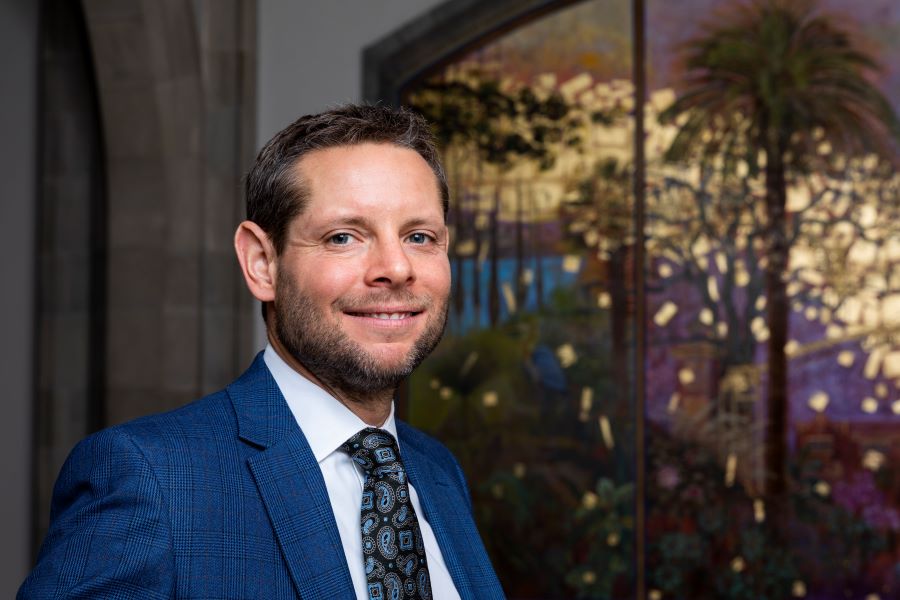Faculty Spotlight: Michael McVicar

Michael McVicar is an associate professor in the Department of Religion, part of Florida State University’s College of Arts and Sciences. His research focuses on the relationship between religion and politics in 20th century U.S. history, specifically the emergence of the American conservative movement in the 20th century. McVicar earned his doctoral degree in 2010 from Ohio State University, and he teaches courses at FSU on contemporary evangelicalism, new religious movements, theory and method in religious studies, and gender and sexuality in religion.
Tell us a little about your background and what brought you to FSU.
I came to FSU in 2013 as an assistant professor after earning my doctoral degree in comparative studies, a program at OSU that allowed me to fuse different fields in the humanities. I built my area of study to include religious studies, 20th century American religious history, and cultural studies. After bouncing around Ohio teaching in adjunct and nontenure-track positions, I was lucky enough to be hired by FSU’s Department of Religion. The department offers a research and teaching track in American religious history, allowing me to further develop my interests in religion and American culture.
Can you break down your areas of academic interest for us?
My primary research and teaching interests focus on the complex relationship between religion and state formation in American history. I’m interested in the reciprocal ways that religious organizations and leaders interact with state institutions. My first book focused on a school of Protestant theology known as Christian Reconstruction and its influence on U.S. politics in the 20th century through its founder, R. J. Rushdoony. I was fascinated with how a relatively obscure man and movement played pivotal roles in shaping mainstream homeschool culture and “survivalist” culture in American political life. Currently, I’m working on a second project that traces how Protestant and Jewish religious groups cooperated with and resisted efforts by state agencies such as the Federal Bureau of Investigation to surveil their political and social activities.
What makes you passionate about your topics of research?
I’ve always been fascinated with idiosyncratic questions: Why did Southern states ban religious believers from handling snakes in churches? How did Sunday schools and women’s church groups in the 1950s help shape the Second Red Scare during the Cold War? How do widely circulating conspiracy theories relate to Protestant theology? My book on Rushdoony relied on access to his massive library of books and personal letters, never explored by any historian before myself. My newest archival obsession is using the Federal Freedom of Information Act, a U.S. law that allows the public to access federal agency records, to request information on the interactions between religious groups and federal agencies. From such sources you can document strange, largely ignored histories that nonetheless helped shape the present moment.
What do you want the public to know about your research? Why are your topics important?
My work focuses on the darker, seedier sides of religious institutions and how they operate to consolidate power. I’m interested in the ways state agencies work to regulate religious beliefs and practices and how these factors often collide in combustible and violently unexpected ways. Such conflicts can be seen in examples like the Philadelphia police department’s bombing of the MOVE organization in 1985 or the Branch Davidian standoff with federal agents in 1993. Both incidents ended in bloodbaths, and outsiders dismissed these groups as “cults” and not “real religions.” It’s precisely these categorizations that create social differences between Americans and cultivate unsettling real-world consequences that I’m most interested in exploring.
Who are your role models? Are there certain people who have influenced you most in your life and career?
My dissertation adviser and professor of religious studies and South Asian studies at OSU, Hugh Urban, pushed me to follow unique routes of research and academic “rabbit holes” while serving as a rigorous, highly productive scholar and fun teacher. I’m also deeply indebted to my undergraduate advisers at Ohio State who inspired my love for teaching and research: John Champlin, retired professor emeritus of political science, and Alan Beyerchen, associate professor emeritus of history.
What is your favorite part of your job? What is the most challenging part of your job?
I enjoy all aspects of teaching and research. Advising graduate students is a unique challenge because of the intense emotional and intellectual work, but it’s also rewarding to help students complete multi-year projects.
What is your best memory so far from working at FSU?
Most of my favorite memories have come from the classroom, so every semester brings something wonderful or memorable. For example, I taught an honors undergraduate course last semester on cultural conflict in contemporary U.S. social and political discourse. The students were so engaged by the material and eager to think critically and historically about modern controversies that seem timeless and intractable. I learned a lot from students during our in-class discussions as they helped me connect to contemporary issues relevant to them that I may not have learned in my usual courses.
Do you have any exciting upcoming projects or goals you’re working towards?
I’m finishing a book on religion and surveillance that traces the relationship between religious organizations to police the political loyalties of Americans from World War I to the Cold War. I hope to have the manuscript done soon!
What do you like to do in your free time?
I like to spend time with my family, travel and cook. Generally, I try to do as little academic work as possible.
If your students only learned one thing from you (of course, hopefully they learn much more than that) what would you hope it to be?
I use every class to emphasize that “religion” isn’t simply about what someone should believe about a certain deity. I want students to move beyond the theological content of religion to consider how religion works as a social engine for creating differences and governing human behaviors.
